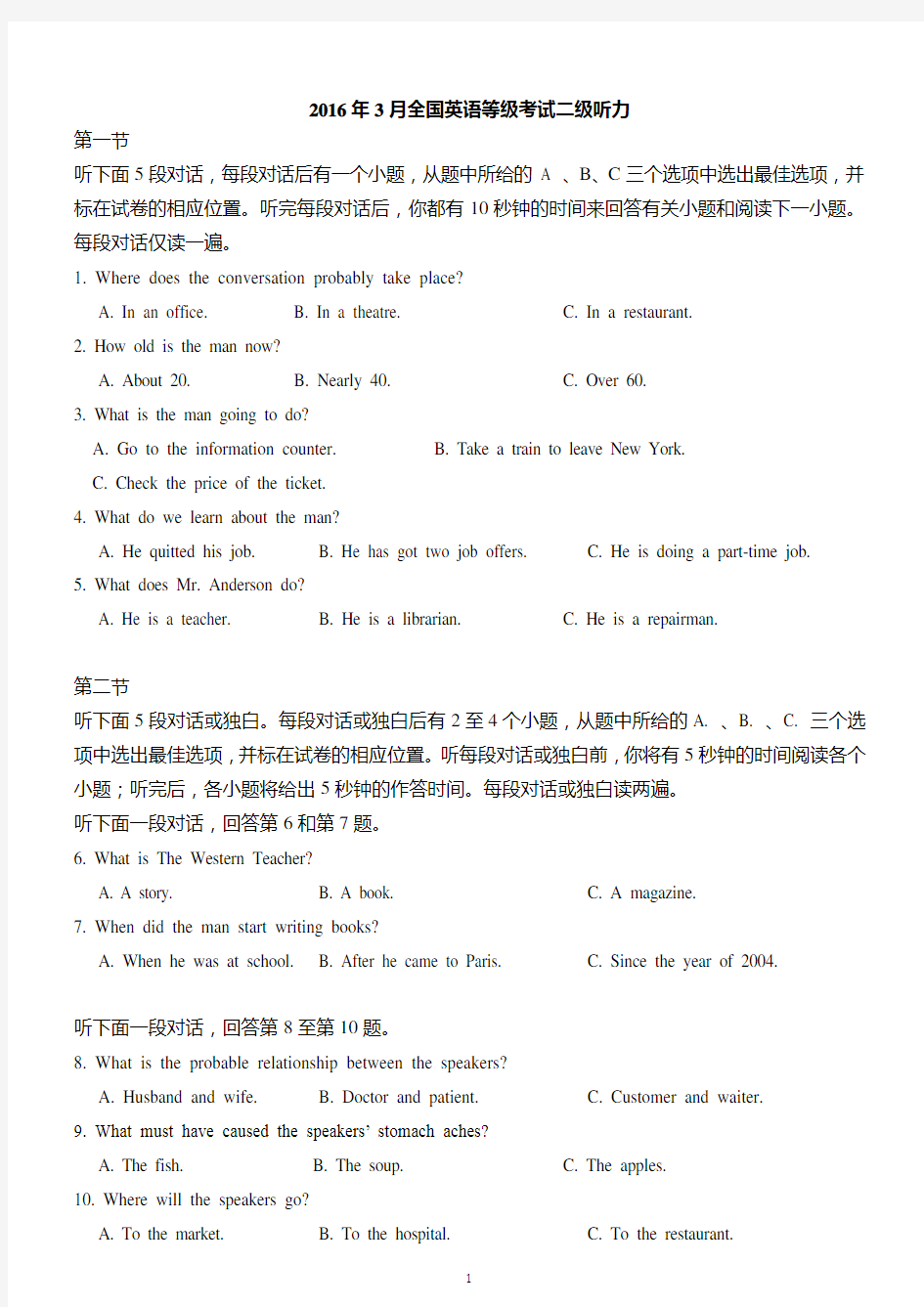2016年3月全国英语等级考试二级听力真题(含录音原文及答案)

- 1、下载文档前请自行甄别文档内容的完整性,平台不提供额外的编辑、内容补充、找答案等附加服务。
- 2、"仅部分预览"的文档,不可在线预览部分如存在完整性等问题,可反馈申请退款(可完整预览的文档不适用该条件!)。
- 3、如文档侵犯您的权益,请联系客服反馈,我们会尽快为您处理(人工客服工作时间:9:00-18:30)。
2016年3月全国英语等级考试二级听力
第一节
听下面5段对话,每段对话后有一个小题,从题中所给的A 、B、C三个选项中选出最佳选项,并标在试卷的相应位置。听完每段对话后,你都有10秒钟的时间来回答有关小题和阅读下一小题。每段对话仅读一遍。
1. Where does the conversation probably take place?
A. In an office.
B. In a theatre.
C. In a restaurant.
2. How old is the man now?
A. About 20.
B. Nearly 40.
C. Over 60.
3. What is the man going to do?
A. Go to the information counter.
B. Take a train to leave New York.
C. Check the price of the ticket.
4. What do we learn about the man?
A. He quitted his job.
B. He has got two job offers.
C. He is doing a part-time job.
5. What does Mr. Anderson do?
A. He is a teacher.
B. He is a librarian.
C. He is a repairman.
第二节
听下面5段对话或独白。每段对话或独白后有2至4个小题,从题中所给的A. 、B. 、C. 三个选项中选出最佳选项,并标在试卷的相应位置。听每段对话或独白前,你将有5秒钟的时间阅读各个小题;听完后,各小题将给出5秒钟的作答时间。每段对话或独白读两遍。
听下面一段对话,回答第6和第7题。
6. What is The Western Teacher?
A. A story.
B. A book.
C. A magazine.
7. When did the man start writing books?
A. When he was at school.
B. After he came to Paris.
C. Since the year of 2004.
听下面一段对话,回答第8至第10题。
8. What is the probable relationship between the speakers?
A. Husband and wife.
B. Doctor and patient.
C. Customer and waiter.
9. What must have caused the speakers’ stomach aches?
A. The fish.
B. The soup.
C. The apples.
10. Where will the speakers go?
A. To the market.
B. To the hospital.
C. To the restaurant.
听下面一段对话,回答第11至第13题。
11. What are the speakers talking about?
A. New films.
B. Popular cinemas.
C. Film-seeing habits.
12. What seems to bother the woman at the cinema?
A. The uncomfortable seat.
B. The noisy people.
C. The long waiting time.
13. What do we know about the man?
A. He prefers seeing new films at the cinema.
B. He enjoys seeing films with friends.
C. He likes talking about new films.
听下面一段对话,回答第14至第17题。
14. Why does David go to Professor Smith for help?
A. He had trouble with today’s lecture.
B. He missed all the classes last week.
C. He wanted to learn how to take notes.
15. What should David do at the start of each class?
A. Have a short talk with the professor.
B. Look through the notes from last class.
C. Take down the main points of the lecture.
16. How can David find the most important information to write down?
A. By remembering all the details of the lecture.
B. By reading the notes taken by his classmates.
C. By focusing on the organization of the lecture.
17. How many suggestions has Professor Smith given to David?
A. Two.
B. Three.
C. Four.
听下面一段独白,回答第18至第20题。
18. Who brought silk to Europe in the thirteenth century?
A. Napoleon.
B. Marco Polo.
C. Leonardo da Vinci.
19. What do we know about silk today?
A. It is used by famous dress designers.
B. It is much cheaper than in the past.
C. It is very popular among painters.
20. Why does the speaker give the talk?
A. To encourage people to learn designing.
B. To persuade people to buy silk clothes.
C. To introduce the history of silk trade.
